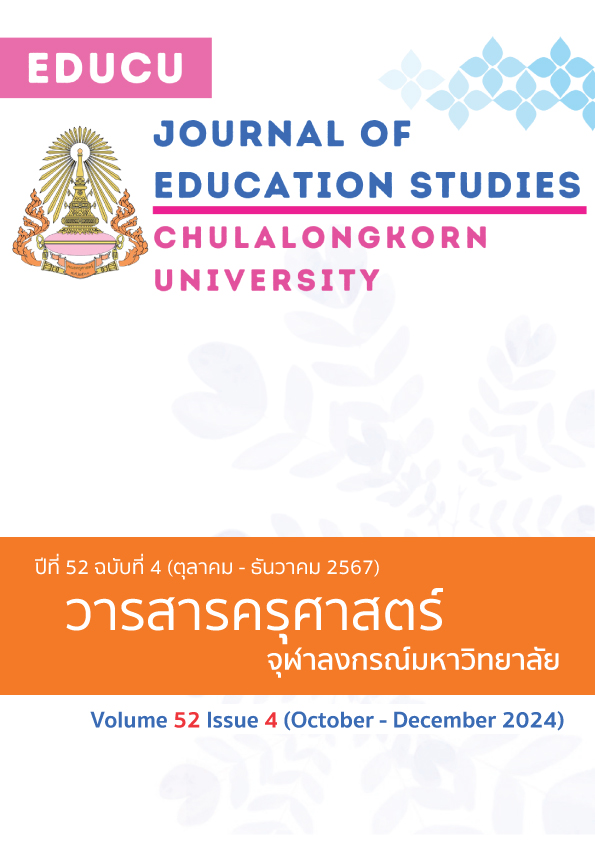A Study of the Impact of COVID-19 on Developmental Decline and Learning Loss in Young Children and Recovery Guidelines
DOI:
https://doi.org/10.14456/educu.2024.60Keywords:
impact of the COVID-19 situation, learning loss of early childhood children, guidelines for recovery, young childrenAbstract
The COVID-19 pandemic significantly affected the educational system, particularly in young children education. There are guidelines for providing young children education during the COVID-19 pandemic, however, they are still broad and unclear in practice. This research aims to 1) study
the impacts of the COVID-19 situation on early childhood children's developmental and learning regression, 2) analyze causal factors that influence teachers’ readiness to organize learning experiences, and 3) examine guidelines to recover the development of early childhood children. Qualitative data were collected via interviews with 50 participants, consisting of administrators and preschool teachers, while quantitative data were gathered using a questionnaire completed by 1,805 preschool teachers in four regions of Thailand selected using multi-stage sampling. Qualitative data were analyzed using content analysis, whereas the quantitative data were analyzed via descriptive statistics and path analysis. The findings found that, 1) the teachers’ perception of the impact of COVID-19 on the developmental decline and learning loss of young children is at a slightly increased level development (M = 0.30, SD = 1.51).
2) the factor model which influenced teachers’ readiness to provide learning experiences during the COVID-19 situation (χ^2 = 10.65, df = 5, p = .06, GFI = 1.00, AGFI = 0.99, CFI = 1.00, RMSEA = 0.01, SRMR=0.00) was directly influenced by the highest working power, which had a positive of influence of 0.66. and 3) practical guidelines for promoting learning management to recover the development and learning of young children after COVID-19 included guidelines for governments, schools, teachers, caregivers, and parents.
References
ภาษาไทย
เครือมาศ ชาวไร่เงิน, เบญจวรรณ บุณยะประพันธ์, และ ชัดดา เพ็ชรประยูร. (2564). การพัฒนาคู่มือการจัดการความเครียด
ของข้าราชการครูและบุคลากรทางการศึกษากรุงเทพมหานคร. วารสารสหวิทยาการ มนุษยศาสตร์และสังคมศาสตร์, 4(2), 581-594.
ไทยพีบีเอส. (2564, 28 เมษายน). Thai PBS ข่าวเด่น. สสส.ห่วงโควิดทำเด็กติดมือถือเพิ่ม พบสถิติดูจอสัปดาห์ละ 35 ชั่วโมง.
https://www.thaipbs.or.th/news/content/303804
ไทยรัฐ. (2564, 23 พฤศจิกายน). ไทยรัฐออนไลน์. แนะวิธีลดช่องว่างการเรียนรู้เด็ก ช่วงโควิด-19 ระบาด.
https://www.thairath.co.th/news/local/2248395.
บุญเลี้ยง ทุมทอง และ ประทวน วันนิจ. (2565). ที่ศึกษาผลกระทบจากสถานการณ์โควิดที่มีต่อการจัดการศึกษาไทย:
การศึกษาทางเลือก คือ ทางหลักและทางรอดในการจัดระบบการศึกษาไทยในอนาคต. วารสารวิชาการธรรมทรรศน์, 22(6), 375-391.
พรพรหม เทพเรืองชัย, เชิดชาย ยอดน้อย, และ ประสิทธิ์ เขียวศรี. (2563, 15 มีนาคม). การเรียนรู้ที่สูญเสียไปของเด็กปฐมวัย
ช่วงโควิด-19 ในพื้นที่ EEC. http://reo8.moe.go.th/web/images/stories
มูลนิธิคีนันแห่งเอเชีย (2563, 20 มกราคม). การแพร่ระบาดของโควิด-19 สร้างผลกระทบต่อการศึกษาไทย.
https://www.kenan-asia.org/th/uncategorized-th/covid-19-education-impact/
วาธิณี วงศาโรจน์ และ ภาสกร ดอกจันทร์. (2565). ผลกระทบทางเศรษฐกิจและสังคมจากสถานการณ์ COVID-19: เด็ก
ปฐมวัย. Journal of Roi Kaensarn Academi, 7(12), 366-377. https://so02.tci-thaijo.org/index.php/
JRKSA/article/view/256933/174659
วิไลลักษณ์ ลังกา, อรอุมา เจริญสุข, พัชราภรณ์ ศรีสวัสดิ์, กัมปนาท บริบูรณ์, โอภาส สุขหวาน, นริสรา พึ่งโพธิ์สภ, อิทธิพัทธ์ สุวทันพรกูล, สุรชัย มีชาญ, ทวิกา ตั้งประภา, มนตา ตุลย์เมธาการ, พนิดา ศกุนตนาค, และ ดวงใจ สีเขียว. (2564). การพัฒนาเครื่องมือและสำรวจสถานการณ์คุณธรรมด้วยตัวชี้วัดคุณธรรม 6 ภูมิภาค (กลุ่มคนไทยช่วงอายุ
-40 ปี). ศูนย์คุณธรรม (องค์การมหาชน).
ศิริชัย กาญจนวาสี, ทวีวัฒน์ ปิตยานนท์, และ ดิเรก ศรีสุโข. (2559). การเลือกใช้สถิติที่เหมาะสมสำหรับการวิจัย
(พิมพ์ครั้งที่ 7). สำนักพิมพ์แห่งจุฬาลงกรณ์มหาวิทยาลัย.
สถาบันวิจัยเพื่อการพัฒนาประเทศไทยและองค์การยูนิเซฟ. (2563). ผลกระทบของโควิด-19 ต่อครอบครัวเปราะบาง.
สถาบันวิจัยเพื่อการพัฒนาประเทศไทย.
สุริยเดว ทรีปาตี. (2555). ต้นทุนชีวิตเด็กและเยาวชนไทย (พิมพ์ครั้งที่ 8). เดือนตุลา.
สำนักงานคณะกรรมการการศึกษาขั้นพื้นฐาน. (2564). แนวทางการเตรียมการเปิดภาคเรียนที่ 2 ปีการศึกษา 2564 ภายใต้
สถานการณ์การแพร่ระบาดของโรคติดเชื้อไวรัสโคโรนา 2019 (Covid-19).
https://www.nma6.go.th/web/wp-content/uploads/2021/10/OpenSchool-2-2564.pdf
หยาดพิรณุ พันธ์ช่วย และ ทวีศิลป์ กุลนภาดล. (2565). การจัดการความเครียดของครูในสถานศึกษาระดับมัธยมศึกษาภายใต้
สถานการณ์การแพร่ระบาดของไวรัสโควิด-19. วารสารบริหารการศึกษา มศว, 19(37), 138-151.
อิทธิพัทธ์ สุวทันพรกุล, อรอุมา เจริญสุข, มนตา ตุลย์เมธาการ, พนิดา ศกุนตนาค, และ ชวภณ สารข้าวคำ. (2565). การศึกษา
ภาวะถดถอยทางการเรียนรู้ของผู้เรียนระดับการศึกษาขั้นพื้นฐานในสถานการณ์โควิด-19: สภาพการณ์ บทเรียน และแนวทางการพัฒนาคุณภาพการเรียนรู้. สำนักงานเลขาธิการสภาการศึกษา.
ภาษาอังกฤษ
Araújo, L. A., Veloso, C. F., Souza, M. C., Azevedo, J. M. C., & Tarro, G. (2021). The potential impact of the
COVID-19 pandemic on child growth and development: a systematic review. Jornal de Pediatric, 97(4), 369-377.
Bao, X., Qu, H., Zhang, R., & Hogan, T. P. (2020). Modeling reading ability gain in kindergarten children during
COVID-19 school closures. International Journal of Environmental Research and Public Health, 17(17), E6371. https://doi.org/10.3390/ijerph17176371
Bronfenbrenner, U. (1979). The Ecology of human development: experiments by nature and design. Harvard
University Press.
Dong, C., Cao, S., & Li, H. (2020). Young children's online learning during COVID-19 pandemic: Chinese parents'
beliefs and attitudes. Children and Youth Services Review, 118, 105440. https://doi.org/10.1016/j.
childyouth.2020.105440
Hidalgo-Andrade, P., Hermosa-Bosano, C., & Paz, C. (2021). Teachers' mental health and self-reported
coping strategies during the COVID-19 pandemic in Ecuador. Psychology Research and Behavior Management Journal, 14, 933–944. https://doi: 10.2147/PRBM.S314844
Loades, M. E., Chatburn, E., Higson-Sweeney, N., Reynolds, S., Shafran, R., Brigden, A., & Crawley, E. (2020).
The impact of social isolation and loneliness on the mental health of children and adolescents in the context of COVID-19. Journal of the American Academy of Child & Adolescent Psychiatry, 59(11), 1218-1239. https://www.jaacap.org/article/S0890-8567(20)30337-3/fulltext
Miles, M., & Huberman, A. (1994). Qualitative Data Analysis (2nd ed). Sage.
Tripathi, S. (2018). Validation of the factor structure of the Positive Life Assets Scale for high school students
in Thailand. International Journal of School & Educational Psychology, 6(1), 3–11. https://doi.org/
1080/21683603.2016.1240128
UNESCO. (2022). Education: From COVID-19 school closures to recovery. https://www.unesco.org/en/covid-
/education-response
Downloads
Published
How to Cite
Issue
Section
License

This work is licensed under a Creative Commons Attribution-NonCommercial-NoDerivatives 4.0 International License.




